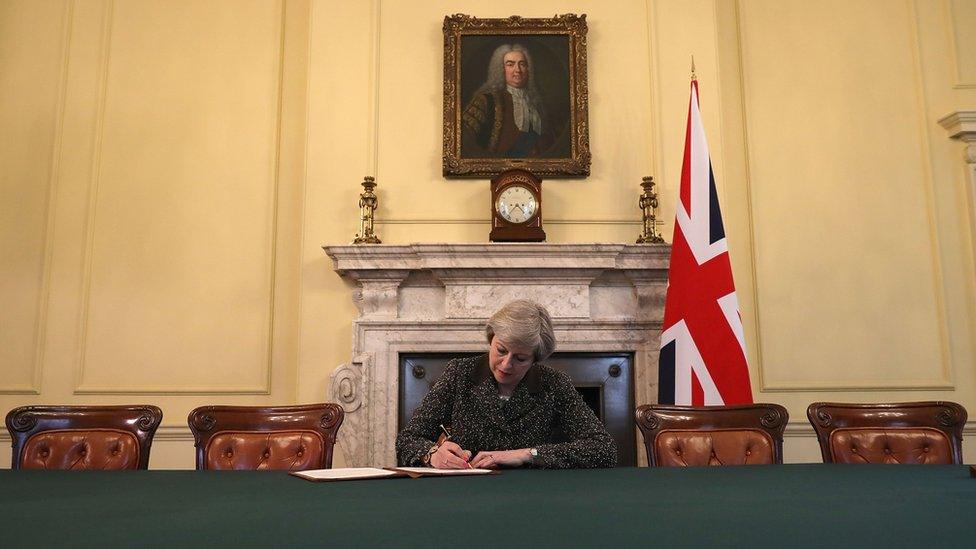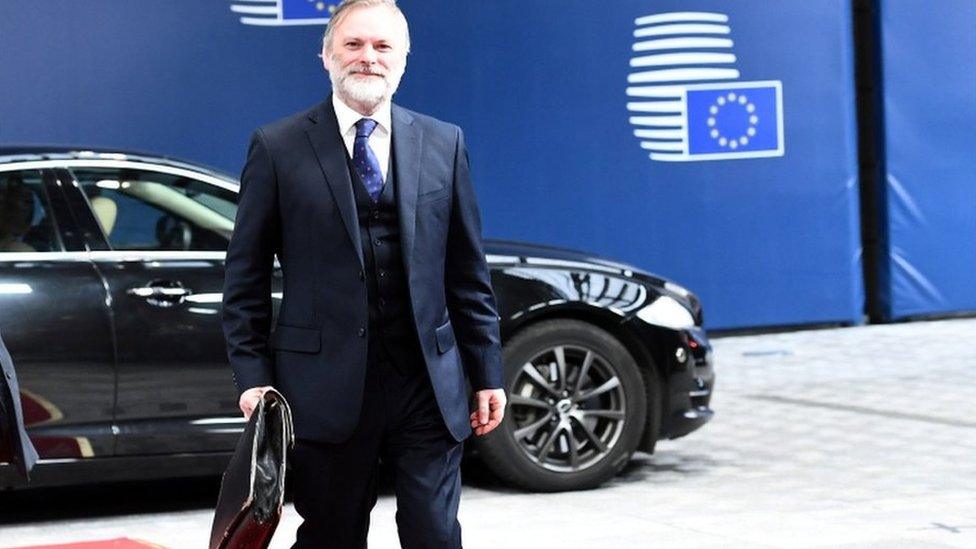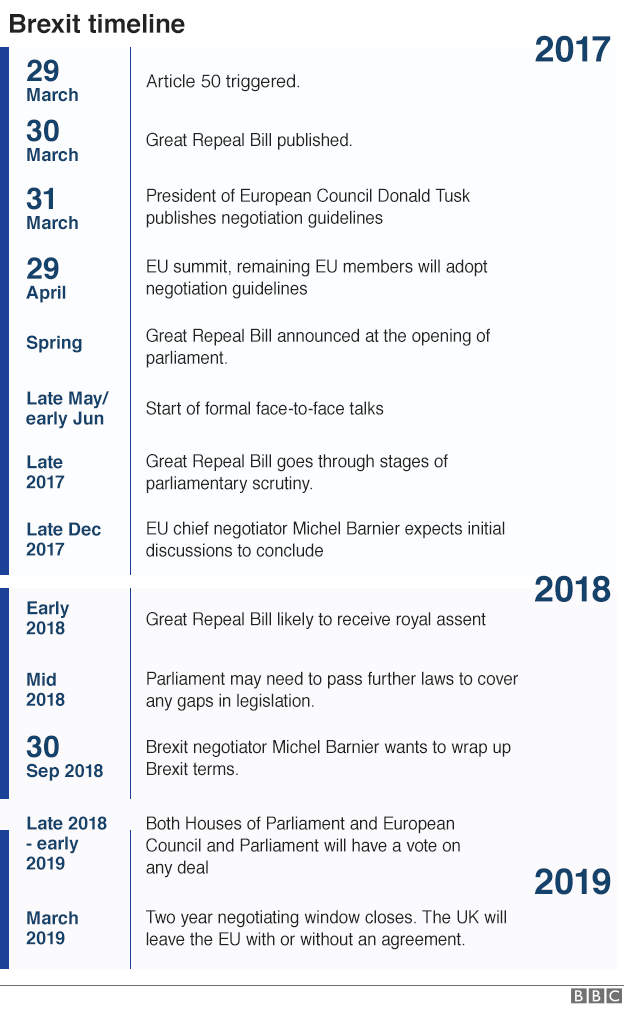Article 50: UK set to formally trigger Brexit process
- Published
- comments

Theresa May signs the letter to the EU confirming the UK's departure
Theresa May has signed the letter that will formally begin the UK's departure from the European Union.
Giving official notice under Article 50 of the Lisbon Treaty, it will be delivered to European Council president Donald Tusk later.
In a statement in the Commons, the prime minister will then tell MPs this marks "the moment for the country to come together".
It follows June's referendum which resulted in a vote to leave the EU.
Mrs May's letter will be delivered at 12:20 BST on Wednesday by the British ambassador to the EU, Sir Tim Barrow.

Sir Tim arrived in Brussels earlier clutching a briefcase containing the Article 50 letter
The prime minister, who chaired an hour long cabinet meeting earlier, has left Downing Street to make a statement to MPs confirming the countdown to the UK's departure from the EU is under way.
She will promise to "represent every person in the whole United Kingdom" during the negotiations - including EU nationals, whose status after Brexit has yet to be settled.
"It is my fierce determination to get the right deal for every single person in this country," she will say.
"For, as we face the opportunities ahead of us on this momentous journey, our shared values, interests and ambitions can - and must - bring us together."

Attempting to move on from the divisions of June's referendum, Mrs May will add: "We are one great union of people and nations with a proud history and a bright future.
"And, now that the decision has been made to leave the EU, it is time to come together."
Labour leader Jeremy Corbyn said his party respected the decision to leave the EU and would hold the government to account "every step of the way".
He said: "Britain is going to change as a result. The question is how."
Mr Corbyn warned it would be "a national failure of historic proportions" if Mrs May does not secure protection for workers' rights.
Chancellor Philip Hammond said the triggering of Article 50 was "a pivotal moment for Britain" and insisted the government "will get a deal".
But he suggested on BBC Radio 4's Today programme that ministers would be prepared to compromise during the process, adding: "Everybody in the EU and the UK is going to go into this negotiation looking to protect their own interests...
"We understand that we can't cherry-pick, we can't have our cake and eat it - that by deciding to leave the EU and negotiate a future relationship with the EU as an independent nation, there will be certain consequences of that and we accept those."
He said EU citizens could still move to the UK and have their full rights while the UK remains "full members of the EU for the next two years".
But crossbench peer Lord Gus O'Donnell, formerly Britain's top civil servant, likened the triggering of Article 50 to being "in a plane being flown by members of the EU and we're about to jump out and we have got a parachute designed by the people flying the plane - and they have designed it in a way to deter anyone else jumping out".
Brexit divorce: 'Conscious uncoupling' or bitter breakup?
Seven decades of the UK in Europe
The PM will be outlining the next steps during a special half hour BBC One interview on Wednesday with Andrew Neil at 19:00 BST on "Britain after Brexit", to mark the triggering of Article 50.
On Tuesday night, Mrs May spoke by telephone to Mr Tusk, EU Commission president Jean-Claude Juncker and German Chancellor Angela Merkel.
Article 50 gives both sides two years to reach agreement, so unless both sides agree to extend the deadline for talks, the UK will leave on 29 March 2019.
Negotiations are expected to begin in mid-May. The UK government says it wants to carry out both separation and trade talks at the same time, but EU chiefs say the two issues must be handled separately.
The UK has said it wants an "early agreement" to guarantee the rights of EU citizens living in the UK and those of British nationals living abroad.
Other issues which are likely to be discussed are things like cross-border security arrangements, the European Arrest Warrant, moving EU agencies which have their headquarters in the UK and the UK's contribution to pensions of EU civil servants - part of a wider "divorce bill" which some reports have suggested could run to £50bn.

Up for discussion
Trade: The UK will withdraw from the single market and seek a new customs arrangement and a free trade agreement with the EU
Expats: The government wants to secure an agreement with European countries "at the earliest opportunity" on the rights of EU nationals in the UK and Britons living in Europe
Brexit bill: The UK government has promised to honour its obligations as it leaves, but has brushed off claims these could run to £50bn
Northern Ireland border: Aiming for "as seamless and frictionless a border as possible between Northern Ireland and Ireland"
Sovereignty: Britain will leave the jurisdiction of the European Court of Justice but seek to set up separate resolution mechanisms for things like trade disputes
Security: The UK government has said it wants to continue to cooperate on security and intelligence-sharing
Transitional deal: An interim arrangement may be needed before the final arrangements come into force

The Lib Dems claimed Mrs May was "pulling the trigger that will set in motion a chain of events which will change this country forever, and doing so without a proper plan", but the Leave Means Leave campaign congratulated her on sticking to her timetable of invoking Article 50 before the end of March.
"Unpatriotic, pro-EU fanatics will continue to try to derail or, at the very least, delay Brexit," the group's co-chairman, Richard Tice, warned.
The PM was forced to consult Parliament before invoking Article 50 after it lost a legal challenge in the Supreme Court, but it secured the backing of most MPs earlier this month.
On Thursday the government is expected to publish details of its "Great Repeal Bill", which aims to convert EU law into domestic legislation and repeal the European Communities Act, which says EU law is supreme to the UK's.

